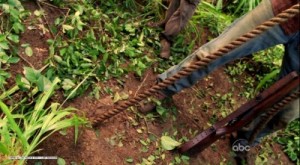This is from the latest New Yorker:
Although I think LOST did an amazing job considering the complexity of what its writers and producers tried to accomplish, perhaps, as they themselves advised us, it is time to let go.
I’m going to post what I think is an “unsolvable LOST problem” for fans to try to make sense of. If you can’t, it may mean that you will have to admit that…LOST was not inerrant!
Here is the plot issue: At the end of season 4, when John Locke went down the well outside the Orchid station, there was a time flash that carried him and the other time-travellers back to a time before the well was built. We know this because we see the rope he had been lowered down was going into the ground, and the well was gone, after the flash occurred.
In the episode “Across the Sea” in season 6, we learned that Jacob’s brother was involved in the digging of that well, or that it had perhaps been dug by the people among whom he eventually lived. And he built the first attempt at a donkey wheel that would allow one to harness the island’s power, and thereby leave the island.
Now when John Locke found himself in the underground cavern beneath the Orchid Station where the donkey wheel was located, Christian Shepard appeared to him, and presumably this was in fact the smoke monster, i.e. Jacob’s brother.
And so an obvious question is how the smoke monster could have appeared to John Locke as Christian Shepard in the underground cavern where the donkey wheel was, at a time when the donkey wheel had not yet been constructed, at a time before Christian Shepard had been born, and before Jacob’s brother had been turned into the smoke monster!
I suspect that, if one is willing to go to great enough lengths, one could probably find a way to make all the details seem to fit. But it would be much like the attempts at harmonizing everything that is found in the Bible. Just about anything can be defended, if there are no limits to the lengths to which you are willing to go to do so. But at some point it becomes preferable to accept the incoherence of a story, rather than continually bring in ad hoc explanations, speculations, and additional storytelling to construct a sufficiently large support structure to make all the disparate details fit.
One good reason to prefer the former option is that the latter approach cheapens that which it seeks to defend. If anything can be defended with enough effort and sufficiently convoluted “explanations”, then the approach that seeks to harmonize and create coherence at all costs ends up placing the Bible, LOST, young-earth creationism, Jesus-mythicism, holocaust denial and any and every other thing, idea or viewpoint into the same category. And so I’d rather acknowledge the humanness of all these works of literature or television, all these ideologies and viewpoints, and assess them fairly, being appreciative of whatever is good and criticizing whatever seems not so good. In the process, we should acknowledge that things that seem plausible or convincing to some of us may not seem that way to others, and in the future things may seem different to just about everyone.
I’m a fan of the Bible, and I’m a fan of LOST. Genuine appreciation can include noticing discrepancies and problems. Fans of Doctor Who and Star Trek have been doing that for years. It is time for fans of LOST – and of the Bible – to do the same. Because true appreciation has to honestly see that which is appreciated for what it is. There can be no honest appreciation of the greatness of literature, film, television, music, or human beings, which does not deal honestly with its subject.
And so I will continue to explore, reflect on, and express my appreciation for LOST, and for the Bible. And there is no reason that such a perspective needs to eschew honesty. Indeed, honesty is essential, because without it, what you appreciate is not the Bible or LOST, but some idealized version that doesn’t correspond to the reality.
















